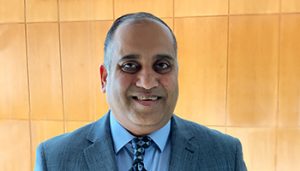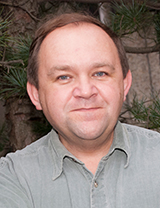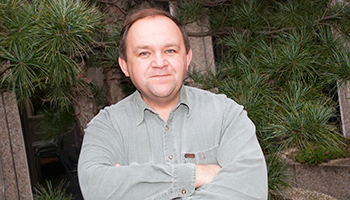
Dr. Clinton Mathias Receives AAI Award

COVID-19: Vaccine Program | Testing | Visitor Guidelines | Information for Employees


It is with a heavy heart and great sadness that I report the untimely passing of our dear colleague Dr. Andrei Medvedev.
Andrei obtained his Ph.D. in Moscow, Russia, and initially trained as a postdoctoral fellow in Trondheim, Norway with Dr. Terje Espevek, where he carried out some of the earliest mechanistic work on TNF receptor signal transduction. In 1996, he moved to the USA to carry out a second postdoctoral position with Dr. Stefanie Vogel at the Uniformed Services University of the Health Sciences, Bethesda, MD where he started a successful career studying the molecular mechanisms underlying endotoxin sensitivity and endotoxin tolerance. In 2002, he moved with Dr. Vogel to the Department of Microbiology and Immunology at the University of Maryland School of Medicine (UMSOM) where he obtained independent funding from NIH and other sources, and rose through the ranks to become an Associate Professor of Microbiology and Immunology. In 2013, he accepted a faculty position in the Department of Immunology at UConn Health and settled in quickly as an educator and researcher. Andrei had a profound impact at UConn Health through his many collaborations, expertise in innate immunity and biochemistry, and his excellence as a mentor and colleague.
He was an incredibly hard worker and his studies in macrophage activation and Toll-like receptor (TLR) signaling was recognized the world over, and he was a highly productive, NIH-funded investigator at both UMSOM and UConn Health. In addition to his outstanding funding and publication records, Andrei was an invited speaker to many universities and scientific conferences. His research spanned the areas of TLR signal transduction in sepsis to autoimmune disease. Some of his most highly cited work was in the field of endotoxin tolerance and the role of Pellino proteins in the regulation of TLR signaling. His major goal was to understand the basis of sepsis, and then implement effective treatment strategies.
Anyone who knew Andrei knew that he was a scientist’s scientist. He was careful, creative, a consummate critical thinker, and a willing collaborator. Andrei never gave up on his research ideas, and through his sustained persistence found great success. On a personal note, Andrei was a generous colleague and a reliable friend. He always enjoyed talking about the traveling he did with his wife and was very proud of his children. Outside of his research pursuits, Andrei possessed a tremendous love of classical music and was a skilled piano and guitar player. He was also a faithful fan of the Washington Capitals NHL hockey team and was elated for weeks when they won the Stanley cup this past spring.
Andrei will be missed by all who knew him, but his legacy and the memories of him will live on. He is survived by his loving wife Svetlana and their children Anastassia and Anton.
Donations may be made to a memorial fund in honor of Andrei Medvedev in support of an early stage investigator seminar in the Department of Immunology, UConn Health:
UConn Foundation
Attn: Aaron Frankel
10 Talcott Notch Road, Suite 100
Farmington, CT 06032
Please indicate “In Honor of Dr. Medvedev” on your donation.
Anthony T. Vella
Professor and Chair
Department of Immunology
UConn School of Medicine
UConn Health
